
VATICAN (CNS) — A long, snail-paced line of well-wishers waited to greet Cardinal Fridolin Ambongo Besungu of Kinshasa, Congo, after the ceremony in which Pope Francis placed a red hat on his head.
But the several hundred Congolese who had come to celebrate with the Capuchin prelate didn’t mind. Small groups sang or played small instruments while they waited.
Men and women waved their nation’s flag, wrapped kerchiefs of their country’s colors around their necks and sported clothing fashioned from specially made, bright-colored fabric bearing images of Our Lady or the cardinal.
“He’s a good man, righteous, speaking out against the suffering people go through,” Fr. Julien Matondo, who serves Congolese Catholics in London, told Catholic News Service.
“We were chosen to free people, not leave them as slaves, and he does that. He can fight for the people, and for that I am proud of him,” added Fr. Matondo, who said he knows about the cardinal from having read his writings, homilies and speeches.
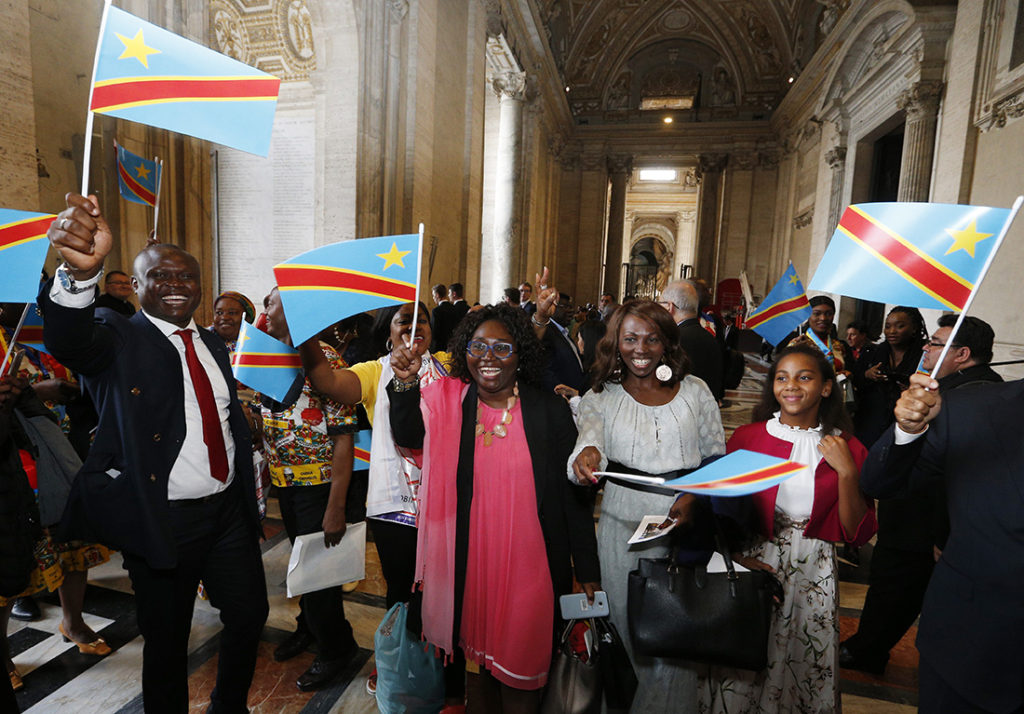
Cardinal Besungu is one of 13 Churchmen from 13 countries welcomed into the College of Cardinals by Pope Francis Oct. 5 during the consistory, a prayer service during which he personally elevates them.
During the ceremony, the Holy Father reminded new and old members of the College of Cardinals how much their ministry and service depends on their realizing how much God loves them and has been compassionate with them.
“Unless I feel that I am the object of God’s compassion, I cannot understand his love,” he said.
A person either feels God’s love or doesn’t, he said, and “If I don’t feel it, how can I share it, bear witness to it, bestow it on others?”
“Am I compassionate toward this or that brother or sister, that bishop, that priest? Or do I constantly tear them down by my attitude of condemnation, of indifference?” he asked, adding that it is a measure of one’s loyalty in ministry.
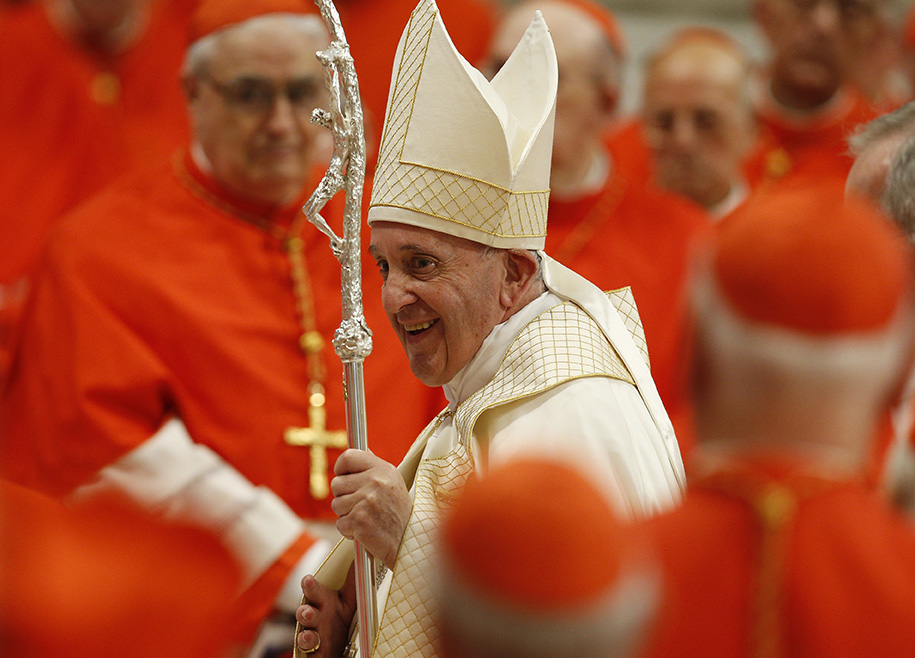
“So many disloyal actions on the part of ecclesiastics are born of the lack of a sense of having been shown compassion, and by the habit of averting one’s gaze, the habit of indifference.”
Pope Francis’ meditation at the ceremony focused on the many ways God has shown his love and concern for His children.
In fact, he said, “the Lord’s compassion is not an occasional, sporadic emotion, but is steadfast and indeed seems to be the attitude of His heart, in which God’s mercy is made incarnate.”
Jesus is the compassionate redeemer of humanity, the pope said. “He incarnates God’s will to purify men and women afflicted by the scourge of sin; He is ‘the outstretched hand of God,’ who touches our sickly flesh and accomplishes this work by bridging the chasm of separation.”
While God is “drenched with compassion,” Pope Francis said, many times people — even Jesus’ disciples — appear to lack compassion; they make excuses or feel indifferent.
The position or ministry someone has in the Church “is not enough to make us compassionate,” he said. An intense, personal awareness within of having been the object of God’s compassion is needed.
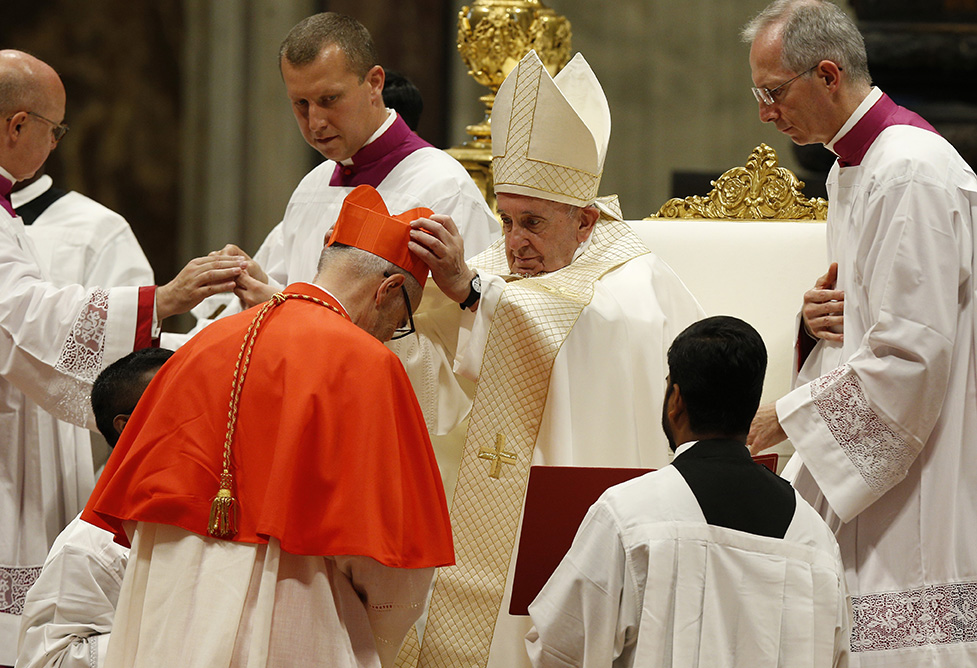
This is why, he said, “I ask this of you, brother cardinals and those about to become cardinals: Do you have a lively awareness of always having been preceded and accompanied by His mercy?”
Without this feeling of His love, it cannot be understood, explained or shared, he said.
“The readiness of a cardinal to shed his own blood — as signified by the scarlet color of your robes — is secure if it is rooted in this awareness of having been shown compassion and in the ability to show compassion in turn,” the pope said. “Otherwise, one cannot be loyal.”
The pope asked the new cardinals to pray that the apostle Peter would intercede on their behalf for the grace “to have a compassionate heart, in order to be witnesses of the one who has looked with favor upon us, who chose us, consecrated us and sent us to bring to everyone His Gospel of salvation.”
Choosing prelates from 13 different nations — eight of whom belong to religious orders — the pope had said he wanted to signal “the missionary vocation of the Church that continues to proclaim the merciful love of God to all men and women of the earth.” The Oct. 5 ceremony fell during the extraordinary Missionary Month.
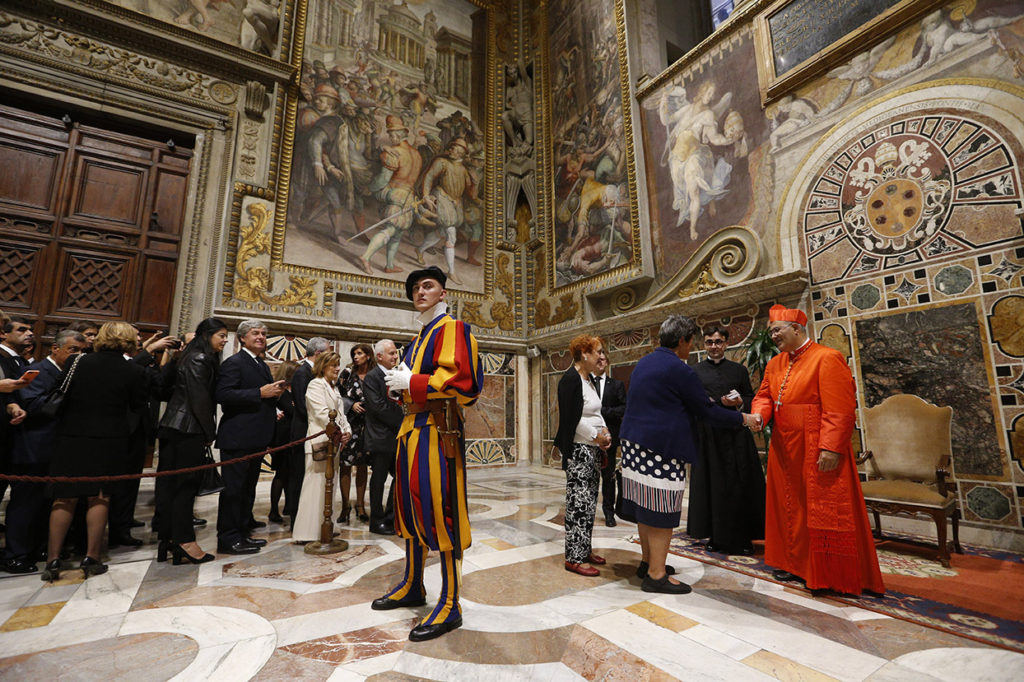
Speaking on behalf of the new cardinals, Cardinal Miguel Angel Ayuso Guixot, president of the Pontifical Council for Interreligious Dialogue, told the pope, “It’s a bit a consistory of religious!”
The Church is a missionary Church that wants to bring God’s mercy and good news everywhere, but especially to those who are suffering because of violence or injustice, Cardinal Ayuso said.
The new cardinals, he said, were praying to have more compassionate hearts, to heal people’s wounds and promote a culture of inclusion and dialogue. Noting the Oct. 4 feast of St. Francis of Assisi, the cardinal said the saint reminded Christians their “only weapon is their humble faith and concrete, compassionate love for all creatures.”
Cardinal Ayuso also promised the pope he would have “our loyal and sincere collaboration” and support “in the mission our Lord has entrusted to you.”
The consistory brought to 225 the total number of cardinals in the world; 128 cardinals are under the age of 80 and eligible to vote in a conclave.
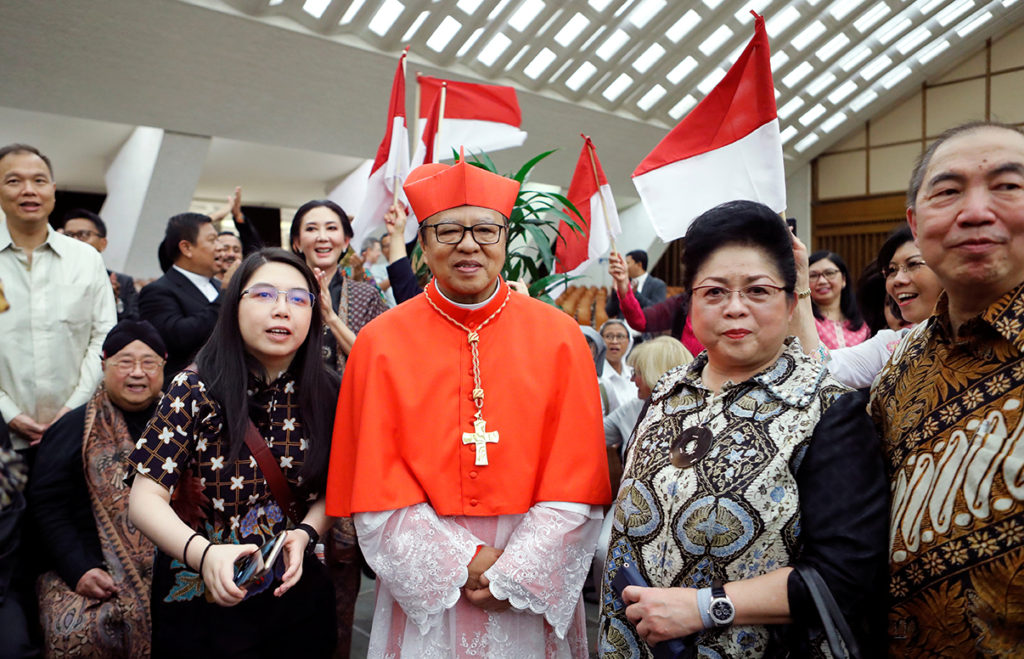
After the new cardinals professed their faith by reciting the Creed and formally swore fidelity and obedience to the pope and his successors, they approached Pope Francis one by one to receive their biretta, their cardinal’s ring and the assignment of a “titular” church in Rome, which makes them part of the Roman clergy.
Hamssananda Ghiri, vice president of the Italian Hindu Union, said it was an honor to be a guest of Cardinal Ayuso.
She has worked with him at conferences on Hindu-Christian dialogue and in small groups that studied Church documents like the encyclical “Laudato Si’” and prepared celebrations honoring Mahatma Gandhi.
“His concept of dialogue is to have a sense of fraternity,” she said. “It’s very precious for us. I know that the prayers of all the faiths will guide him” in his new role.
As they waited in receiving lines, relatives and friends of several of the new cardinals told stories that highlighted the Churchmen’s humility and compassion for the poor and forgotten, themes that Pope Francis stressed during the consistory.
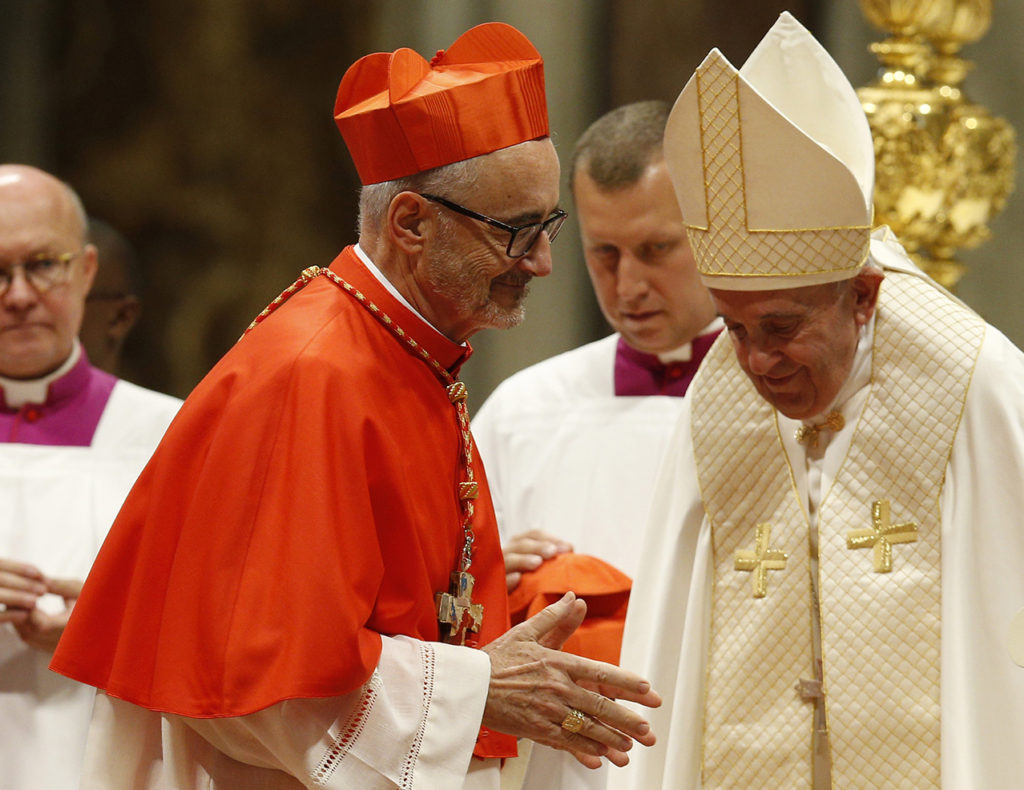
Relatives, friends and colleagues of new cardinals described them as unpretentious men who stand with the poorest and most marginalized people and who are open to dialogue.
Robert and Katharina Czerny had traveled from Ottawa, Canada, to see his brother, Cardinal Michael Czerny, a Jesuit, receive his red hat from Pope Francis.
“It was quite a shock,” Katharina Czerny said of hearing the news that her brother-in-law was to become a cardinal, especially since he was not even a bishop at the time. “It was unexpected, never talked about. It wasn’t in his plans.”
The cardinal, who is undersecretary of the Migrants and Refugees Section of the Dicastery for Promoting Integral Human Development, has been involved in social justice issues all his life, she said.
She added that the pope’s choice is “confirmation that what (he) is doing is very important, and that this is where we should be as Church, dealing with the real things of the world.”
Robert Czerny said his brother takes on new tasks willingly and welcomes others to work with him. “Whatever he’s asked to do, he plunges in and figures it out,” he said. “He does not assume he already knows everything.”
Many of the new cardinals are missionaries, and several work in places where Catholics and Christians are in the minority.
Asked two days before the consistory about the significance of his selection, now-Cardinal Cristobal Lopez Romero of Rabat, Morocco, told reporters, “For the people of Rabat, I don’t think it means much, because most don’t know the difference between a cardinal and an altar boy. It’s new. Most don’t even know what a bishop is.”
The message to the Church, however, was one of encouragement, he said.
“I think what the pope wanted to do is make visible Churches that were practically invisible,” he said. “The pope has seen how we live the faith as a minority, and he thought our experience could enlighten other Churches throughout the world.”
Among the new cardinals are three over age 80, the cutoff age for voting in a conclave to choose the next pope.
Cardinal Eugenio dal Corso, 80, plans to continue working in the huge Diocese of Benguela, Angola, the country where he has spent most of his life as a missionary of the Poor Servants of the Divine Providence, also called the St. John Calabria Congregation.
Speaking with reporters two days before the consistory, he said he believes the pope chose him because after retiring, he returned to a very poor area as a missionary.
“When the pope announced he was going to make me a cardinal, (local people) started to cry, (thinking) ‘Now you will go away,’” he said. But he told them, “No, no. no, the pope can’t take me away from here. I am very happy to come back to be with you.”
The pope also honored now-Cardinal Sigitas Tamkevicius, a Church leader who has suffered deeply for his faith, spending 10 years in prison in Siberia.
Darius Chmieliauskas, head of communications for the Archdiocese of Kaunas, Lithuania, told CNS that the pope had chosen a hidden jewel in their country by pointing the spotlight on their retired archbishop, Cardinal Tamkevicius.
For years, the cardinal gathered evidence about Soviet persecution in Lithuania and provided it to diplomats, the media, dissenters who fled to the West and Vatican Radio.
“He was a small stone in the big shoe of the USSR,” Chmieliauskas said.
Pope Francis got to know the cardinal during his visit to Lithuania in 2018, and he was deeply moved as the then-archbishop showed him the cell where he had been interrogated and the execution hall where Soviet KGB agents had killed priests and bishops.
After the consistory, the cardinal told Chmieliauskas that the pope had wept as he placed his hat — scarlet for the color of the blood he was willing to shed for the faith — on his head, perhaps recalling the persecution and sacrifice the cardinal had endured.
Chmieliauskas said the 80-year-old Jesuit cardinal’s courage is a beacon for the Church.
“We need more people like him,” he said, “simple and brave, humble and strong.”
The new cardinals are:
Cardinal Michael Czerny, undersecretary of the Section for Migrants and Refugees at the Dicastery for Promoting Integral Human Development. Canadian Jesuit, 73;
Cardinal Juan García Rodríguez, archbishop of Havana, 71;
Cardinal Alvaro Ramazzini Imeri, bishop of Huehuetenango, Guatemala, 72;
Cardinal Fridolin Ambongo Besungu, archbishop of Kinshasa, Congo, and member of the Capuchins, 59;
Cardinal Miguel Angel Ayuso Guixot, president of the Pontifical Council for Interreligious Dialogue, from Spain, 67;
Cardinal Jose Tolentino Calaca de Mendonca, Vatican archivist and librarian, from Portugal, 53;
Cardinal Eugenio dal Corso of Benguela, retired bishop of Benguela, Angola, an Italian member of the congregation of the Poor Servants of Divine Providence, 80;
Cardinal Michael Fitzgerald, an English Missionary of Africa, who had served as president of the Pontifical Council for Interreligious Dialogue and later as Vatican nuncio to Egypt, 82;
Cardinal Jean-Claude Hollerich, archbishop of Luxembourg, Jesuit, 61;
Cardinal Cristobal Lopez Romero, archbishop of Rabat, Morocco, Spanish member of the Salesians, 67;
Cardinal Ignatius Suharyo Hardjoatmodjo, archbishop of Jakarta, Indonesia, 69;
Cardinal Sigitas Tamkevicius, retired archbishop of Kaunas, Lithuania, Jesuit, 80;
and Cardinal Matteo Zuppi, archbishop of Bologna, Italy, 63.
Contributing to this story was Junno Arocho Esteves, Barbara J. Fraser and Carol Glatz from Catholic News Service.





